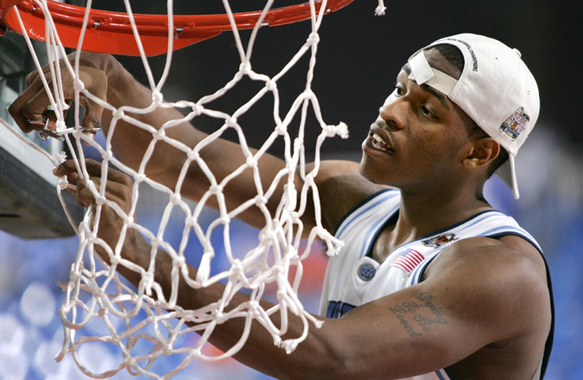By Paul L. Thomas, Ed.D. | Originally Published at The Becoming Radical. October 23, 2014 | Rashad McCants won a title for UNC while skating through sham classes. (AP/Eric Gay)
Writing about the newly released investigation of academic fraud at the University of North Carolina, Barry Petchesky opens with:
We knew that UNC’s Department of African and Afro-American Studies offered sham classes. After the release of today’s independent investigation we now know it went on for nearly two decades, and involved thousands of students—nearly half of them athletes.
Let’s get the moralizing out of the way up top before we dive in: just remember, as you read this and are tempted to point out (accurately) that every program has joke classes, that the entire basis for amateurism relies on the idea that these athletes are paid with an education.
I want, as Petchesky requests, to reject using this report to bash specifically UNC athletics or academics, but I also want to note two claims here: “every program has joke classes” and “athletes are paid with an education.”
First, however, I must stress that I have made the case before that there simply is no credible connection between academics and athletics; thus, the obsession with scholastic sport in the U.S. is itself the problem. Every time we persist in using sport participation to entice and/or blackmail young people into committing to academics, we are corrupting both sport and academics.
In literature (see Margaret Atwood’s The Handmaid’s Tale, for example) and research in behavioral science and economics (see Sendhil Mullainathan and Eldar Shafir’s Scarcity, for example), we have ample evidence that individual and collective behavior is often profoundly impacted by larger (and often interrelated) norms.
Not to overstate, but historical human scars on history such as the Holocaust or U.S. slavery are powerful narratives of how otherwise good people tolerated and even participated in barbarism—significantly because those actions appeared “right” in the context of an inexcusable set of cultural norms (eradicating Jews as the “Others,” enslaving blacks as the “Others”).
On a much smaller scale, then, if “every program has joke classes,” as Petchesky claims, then we must see UNC’s academic fraud as reflective of the utter failure of all scholastic sport.
By any credible measures, UNC is an elite academic institution and athletic program; thus, UNC has everything to gain from not stooping to academic fraud, and far more than most to lose by sinking into the norm of “every program has joke classes.”
And this, I think, leads to “athletes are paid with an education.”
While “paid” is a foundational concept in the U.S., it certainly is problematic. Once the payment gains more value to a person that the act itself, whatever leads to the payment becomes tarnished; this is the essential problem with external rewards.
Humans, again perfectly decent people in most all circumstances, are often apt to bend the rules of ethics as long as the payment keeps flowing—or the payment increases. As long as an education is merely “payment” for most college athletes, academics and athletics will both be corrupted. (My point here is that education and athletics should remain their own rewards—neither reduced as a means to the other.)
And this is particularly true because this claim—”athletes are paid with an education”—has another serious problem: For both athletes and non-athletes in the U.S., education is in fact not a terminal payment, but a means to terminal payment (while this claim is mostly misleading, we also bribe all students to commit to education by showing them charts correlating higher educational attainment with greater life-long salaries, despite evidence that race and class are greater indicators of attaining work and level of salary).
The ugly truth is that some or even many athletes see no value in formal education; an even uglier truth is that some athletes and non-athletes are correct when they do not value formal education because their lives and avocations will be just fine—or even exemplary—without formal education.
Athletes—like artists, musicians, or actors—may have gifts that are not traditionally academic and thus bribing them to participate in academics in order to play sport is creating the exact environment in which “every program has joke classes” becomes inevitable.
Those involved in academic fraud at UNC, or anywhere, in pursuit of athletic success should not be ignored, but if we once again punish and then ratchet up accountability and oversight because of this scandal, we are ultimately to blame for the next scandal because this UNC academic fraud case is an indictment of the entire scholastic sport machine, a machine that ultimately chews up and spits out the exact young people it claims to support.
P. L. Thomas, Associate Professor of Education (Furman University, Greenville SC), taught high school English in rural South Carolina before moving to teacher education. He is a column editor for English Journal (National Council of Teachers of English) and series editor for Critical Literacy Teaching Series: Challenging Authors and Genres (Sense Publishers), in which he authored the first volume, Challenging Genres: Comics and Graphic Novels (2010). He has served on major committees with NCTE and co-edits The South Carolina English Teacher for SCCTE
This piece was reprinted by EmpathyEducates with permission or license. We thank the Author, Paul L. Thomas, Ed.D. for giving voice to educational ethics.












Leave A Comment